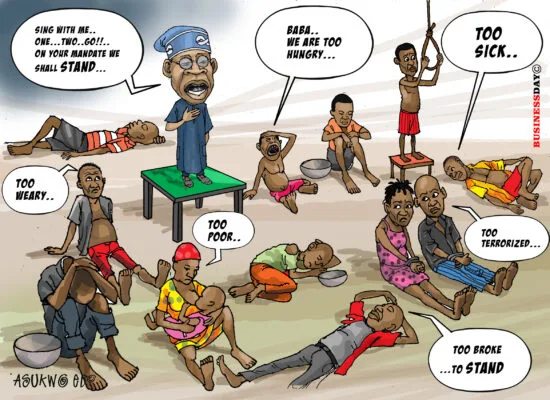Nigerians Despair Over Unfulfilled Promises
On May 29, 2023, Nigeria’s President Ahmed Bola Tinubu made a significant decision that changed the country’s economy: the removal of oil subsidies. This action has had a profound effect on everyday Nigerians, as rising living costs have led to intense economic hardship. Since the removal, countless voices from across the nation have been pleading for relief. Yet, these cries appear to have fallen on deaf ears, as Nigerians continue to face rising costs and unemployment.
The president’s October 1, 2024, broadcast on Nigeria’s 64th independence anniversary was expected to bring some hope. After months of suffering, Nigerians tuned in with high hopes that their pain would be acknowledged and relief would be forthcoming. Yet, the promises made during that speech seem to have been nothing more than words of optimism.
Join our WhatsApp ChannelThe Rising Cost of Living
Since the subsidy was removed, inflation has skyrocketed, making basic necessities like food, fuel, and transportation difficult for many to afford. Speaking to a local vendor in Lagos, a father of four, he expressed his frustration: “We have been waiting for change, but nothing seems to happen. Everything is expensive, and it’s hard to feed my children. We thought things would improve after the speech, but it’s still the same.”
President Tinubu did acknowledge the pain during his broadcast, stating, “Our administration understands that many of you are struggling with rising living costs.” This admission brought a glimmer of hope to many Nigerians. The president’s words gave citizens reason to believe that the government might finally respond to their struggles and introduce policies to mitigate the hardships.
READ ALSO:Nigerians Tackle First Lady, Senate President Over Fuel Hike Comments
However, by the end of the broadcast, those hopes had been dashed. While President Tinubu assured Nigerians that his administration was committed to finding long-term solutions, no tangible steps were outlined. The much-anticipated restoration of oil subsidies never came, leaving millions in deeper despair.
Enduring the Hardship
Many Nigerians feel that their voices have been ignored despite the government’s promises. Citizens have become increasingly disillusioned, comparing their plight to the biblical analogy of being crowned with thorns. “We are told to endure, but how much longer can we endure when prices keep going up and there is no help in sight?” asked a frustrated trader in Abuja.
Politicians, particularly those in leadership positions, are expected to listen to the people and act on their behalf. However, in this case, the government’s failure to act has only deepened the sense of betrayal. The initial promise of a “better Nigeria” after the oil subsidy removal has yet to materialize, and many feel abandoned by the same leaders who vowed to improve their lives.
The People vs. The Government
A significant concern among Nigerians is that the removal of the subsidy has disproportionately affected the poorest members of society. The working class and lower-income families have been hit the hardest, as they are forced to spend a significant portion of their earnings on fuel and food. With little relief in sight, many are beginning to lose faith in the government.
“It feels like they’re not listening to us,” said a schoolteacher in Lagos. “We are the ones suffering, but the rich and the politicians are not feeling this pain. When will they finally hear us?”
Despite repeated assurances from the president, there remains little evidence that the government is taking decisive action to alleviate the economic strain. Instead, many citizens feel as though they are being asked to endure hardships with no clear timeline for improvement.
Broken Promises, Broken Spirits
The disappointment felt by Nigerians is palpable. In a country where the majority of the population already lives below the poverty line, the oil subsidy removal has pushed many into even deeper poverty. The promise of better governance under President Tinubu’s leadership is quickly losing its shine.
Activists and economic experts have urged the government to reconsider its stance on the subsidies and explore alternative measures to relieve the economic burden on citizens. However, so far, there has been little movement on this front. The government seems more focused on long-term solutions, which do not address the immediate suffering of the people.
“I have heard enough promises,” said an elderly man outside a petrol station in Ajao Estate, Lagos state. “We don’t need more speeches. We need action.”
The Road Ahead
It is clear that Nigerians are becoming increasingly impatient with the government’s lack of action. While the president has promised long-term solutions, the immediate reality is that millions of citizens are struggling to survive each day. Without a concrete plan to restore the oil subsidies or introduce meaningful economic relief, the government risks alienating the very people it is meant to serve.
Many are beginning to question the effectiveness of the administration and whether they are truly being listened to. “How long can we continue like this?” a civil servant in Lagos asked. “We are running out of time and patience.”
As the months drag on, the government’s response to the outcry will determine the future relationship between the people and their leaders. Nigerians are no longer content with mere words; they demand action, and they demand it now.
In the face of this rising tension, it remains to be seen whether the government will finally heed the voices of its people or if it will continue to tread a path that leaves many behind. For now, the promise of relief remains elusive, and Nigerians are left to wonder if their cries will ever be heard.
Emmanuel Ochayi is a journalist. He is a graduate of the University of Lagos, School of first choice and the nations pride. Emmanuel is keen on exploring writing angles in different areas, including Business, climate change, politics, Education, and others.
- Emmanuel Ochayihttps://www.primebusiness.africa/author/ochayi/
- Emmanuel Ochayihttps://www.primebusiness.africa/author/ochayi/
- Emmanuel Ochayihttps://www.primebusiness.africa/author/ochayi/
- Emmanuel Ochayihttps://www.primebusiness.africa/author/ochayi/


















Follow Us